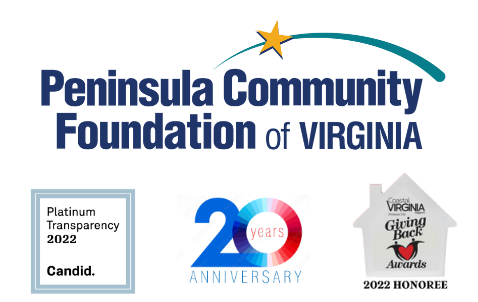Hello from THE peninsula community foundation!We hope this note finds you well. In our community and across the country, families are gearing up for a busy end of year. Giving season shifts into full gear, and we look forward to working with you! Whether you've already established your donor-advised or other type of fund at the community foundation or are currently considering it, please reach out. We would love to help you get even more connected to the causes you care about while maximizing tax benefits at the same time.
In this issue, we’re covering topics that are on the minds of many people as the year winds down. |
- Retirement and charitable giving continue to be intertwined. Over the last few years, we've all seen retirees who've gone back to work, colleagues who decided to retire early, and everything in between. Because IRAs and other retirement accounts are such useful assets for charitable giving, it is important to recognize the opportunities presented for charitable giving at every stage of retirement, from contemplating retirement all the way through to permanent retirement. Learn how the community foundation has you covered!
- Meeting your charitable goals does not have to be stressful. The end of the year is a well-documented season of anxiety for many people. Fortunately, working through the list of organizations you'd like to support can be a bright spot. Your team at the community foundation can help you accomplish your charitable giving objectives efficiently, effectively, and joyfully, including tapping into tax benefits. Learn why waiting until the end of the year to complete your giving actually has a silver lining.
- Do good, feel better. It is not your imagination! When you give to charity or do something good for others, you really do feel better. From reductions in risks for high blood pressure to sleeping better at night, learn why philanthropy is such a powerful catalyst for well-being--both your own well-being and the health and happiness of the people whose lives you are improving through gifts to your favorite nonprofits.
- Community foundation donor-advised funds vs. commercial funds. When discussing donor-advised funds with local philanthropists, a common question we hear is: What’s the difference between opening a community foundation fund versus a commercial fund? The simple answer is that donor-advised funds at community foundations provide philanthropists with opportunities to strengthen their community and maximize the impact of their charitable giving in ways that commercial gift funds at financial firms cannot.
Thanks again for all you do. We are honored to work together and wish you the best.
Michael Monteith
CEO, Peninsula Community Foundation of Virginia
Retirement strategies: Tax benefits and beyond
|
At the community foundation, we regularly talk with retirement-age donors and fund holders about the tax benefits of Qualified Charitable Distributions and leaving bequests of IRAs to a donor-advised fund at the community foundation. But getting involved in philanthropy can be so much more than that for retirees and people who are gearing up (or down!) for retirement. This is particularly relevant as some retirees consider returning to work and contemplate what that means for their charitable giving and volunteering plans.
You’ve likely heard the statistic that 10,000 people in the United States are turning 65 every day. And while 65 may be the “traditional” retirement age in this country, the milestone appears to be anything but traditional nowadays. While Covid-19 did not impact retirement ages as much as some might have predicted, many of those who did retire |
actually now regret it. While many retirees are seeking work for financial reasons, two of the top six reasons to go back to work involve boredom or loneliness.
For people who’ve reached a theoretical retirement age, working or returning to work provides many opportunities that tie into philanthropy. For example:
For those who’ve retired for good, remember that many of the organizations you care about could likely use your help not only financially as a donor, but also as a volunteer, board member, or community advocate.
Please reach out to your team at the Peninsula Community Foundation. We’d love to work with you on your charitable giving plans for retirement, un-retirement, or re-retirement, as the case may be! Your seasoned professional skills and civic commitment are truly valuable to improve the quality of life in our community.
For people who’ve reached a theoretical retirement age, working or returning to work provides many opportunities that tie into philanthropy. For example:
- You can still contribute to your IRAs (which many people do not realize), and if there’s an employer-sponsored 401(k) plan, all the better.
- You can use your extra income to fund your donor-advised fund at the community foundation, making you eligible for an income tax deduction as well as removing assets from your taxable estate.
- As you take advantage of the opportunity to get more involved with causes you care about in your free time (which has perhaps increased because children have grown), you can update your estate plan to leave additional bequests to your donor-advised fund at the community foundation to support your favorite causes after you’re gone.
- And of course, if you are 70 ½ or older, you can take advantage of the Qualified Charitable Distribution (QCD) which allows you to direct up to $100,000 annually from your IRA to a qualified charity, and even more in future years as the $100,000 cap is indexed for inflation. Plus, if you’ve reached the age when you are required to take distributions from your IRAs, QCDs will offset those Required Minimum Distributions (RMDs).
For those who’ve retired for good, remember that many of the organizations you care about could likely use your help not only financially as a donor, but also as a volunteer, board member, or community advocate.
Please reach out to your team at the Peninsula Community Foundation. We’d love to work with you on your charitable giving plans for retirement, un-retirement, or re-retirement, as the case may be! Your seasoned professional skills and civic commitment are truly valuable to improve the quality of life in our community.
Fourth quarter jitters: Charitable giving tips to reduce your stressYou are not alone if you begin to feel a little anxious when October rolls around. Many people experience year-end stress, whether because of looming deadlines at work, tax-related estate planning cut-off dates, anticipating a busy holiday season of travel and social engagements, or simply the realization that another year is coming to a close and there’s not a lot of time left to check off items on the 2023 punch list.
To top it all off, many families do a lot of their charitable giving at year end, too. But that’s one area that does not need to be stressful. Your giving can be more easily accomplished than sending invitations, herding family members, guessing colors or sizes, and remembering who to include–or not! |
Here are four tips for alleviating fourth-quarter stress and still be able to hit your charitable goals for 2023.
Completing your 2023 charitable giving can reinforce philanthropy’s win-win value proposition: You can check a task off your list by supporting causes and organizations that are important to you and receive key tax benefits, and those in need will appreciate your generosity while feeling a greater sense of the season’s spirit.
- Using your donor-advised fund at the community foundation makes giving very convenient. Through the foundation’s online portal, you can easily view a list of all of the organizations you’ve supported so far this year, make note of the ones you missed or want to add, and then finish the annual task.
- Your late-year timing could actually be useful for the organizations you care about, given the pronounced need for support during the gift-giving time of year, whether that’s to an organization seeking to achieve its own year-end goals or an organization that provides food or utility bill relief during the cold winter months. According to National Giving Month, 31% of charitable giving occurs in December; 12% of giving typically occurs between December 29 and 31; and 28% of nonprofits raise as much as 50% of their funding in December.
- Charitable needs are heightened during the fourth quarter because it is especially stressful for people experiencing financial challenges. For 52% of respondents surveyed in a 2023 study, money was the most cited factor that negatively affects their mental health, a level 25% higher than a year ago. The organizations supporting these people are in high gear during the fourth quarter and holiday season.
- By the end of the year, you will likely have a better idea of your financial situation, ideal target amount for charitable tax deductions, and the performance of stock in your portfolio. This will allow you to make gifts to your donor-advised fund of highly-appreciated stock, avoid capital gains, and reduce your taxable estate. And, of course, the proceeds of that stock will hit your donor-advised fund tax free, so the full amount of the sale price is available to support your charitable giving priorities.
Completing your 2023 charitable giving can reinforce philanthropy’s win-win value proposition: You can check a task off your list by supporting causes and organizations that are important to you and receive key tax benefits, and those in need will appreciate your generosity while feeling a greater sense of the season’s spirit.
Do good, feel better: Philanthropy through the lens of well-beingPhilanthropy means “love of humanity”—and, according to some, “philanthropy” includes acts that benefit both the giver and the receiver. This is surprising to some people who have been taught “it’s better to give than to receive.”
Somehow we have popularized the idea that giving should “hurt.” But that is not what the research says. Consider just a few examples:
|
- Another study indicates that giving reduces cortisol levels.
- Yet another study found a link between unselfishness and a lower risk of early death because “helping others” reduces stress-related mortality.
- Research has linked doing something good for someone else to an increase in endorphins.
- An altruistic attitude in the workplace makes you more productive and less likely to quit.
- Doing good and being grateful helps you sleep better at night.
- People who do just one good thing a week for someone else actually become happier over time.
Even just thinking about what you’ve given others–and not only just being grateful for what you've received–is a huge motivator to do good things for others, over and over again.
The “do good feel good” benefits of philanthropy are just one of the many reasons that so many individuals and families work with the community foundation. If you’ve already established a donor-advised or other type of fund with the community foundation, we look forward to continuing to help you fulfill your charitable wishes to improve the lives of others. If you’ve not yet established a fund at the community foundation, we look forward to working with you to make a difference in the causes you care about.
Donor-advised funds held at a national financial institution vs. your LOCAL community foundationDonor-advised funds are becoming a more and more popular charitable planning tool and can be established through a national financial institution or your local community foundation. So, which makes more sense for the fund holder and their community? In almost all cases it is a far better fit for donors to set up a fund at a community foundation and here’s why. A community foundation offers its donor-advised fund holders much broader services, more personal attention, and deeper connections to the nonprofits whose work is essential to effecting positive community change.
|
Having a community foundation fund provides philanthropists with opportunities to strengthen their community and maximize the impact of their charitable giving in ways that commercial gift funds at national financial firms cannot.
The Peninsula Community Foundation offers donor-advised fund holders the same tax and administrative benefits as a commercial gift fund, including:
Unlike standard commercial gift funds, though, the Peninsula Community Foundation offers high-level, customized services to its donor-advised fund holders, including:
Our donor-advised funds at the Peninsula Community Foundation, receive the attention they deserve and give you the opportunity to make a difference in the causes you care about the most as well as the community at large. This combined effort of the Foundation and its donor-advised fund partners has resulted in significant annual giving and reinvestment into your community, $2.2 million in 2022 alone. Establishing a donor-advised fund at the Peninsula Community Foundation is also very easy, just give us a call or click here to learn more.
The Peninsula Community Foundation offers donor-advised fund holders the same tax and administrative benefits as a commercial gift fund, including:
- Online access to the donor-advised fund to view balances, contributions, and grants
- Simple process for requesting grants to favorite charities
- Streamlined tax reporting, often represented by just one letter to provide to an accountant at tax time, even when the donor-advised fund is used to support dozens of individual charities throughout the year
- All back-office administration, tax receipts, recordkeeping, and other requirements for the donor-advised fund’s 501(c)(3) status
- Favorable tax-deductibility of contributions to the fund
Unlike standard commercial gift funds, though, the Peninsula Community Foundation offers high-level, customized services to its donor-advised fund holders, including:
- Concierge-level service by knowledgeable staff to structure estate gifts to charities and accept gifts of appreciated stock or complex assets such as real estate or closely-held stock
- In-house experts who have a finger on the pulse of community needs, the strengths of specific nonprofits, and how to structure grant making for the highest possible community benefit
- Opportunities to collaborate with other donors who care about similar issues and forums to tap into local and national subject matter experts
- Opportunities to go deep into specific issue areas, both through education and hands-on involvement
- Assistance with structuring and measuring the impact of grants
- Family philanthropy and corporate giving services to foster a well-rounded, holistic approach to philanthropy
- Administrative fees that are reinvested into the community foundation, itself a nonprofit, to help support operations, grow its mission, and help even more donors support the causes they care about
- Hands-on assistance from local experts who understand both local and distant needs, and welcome the opportunity to research and identify causes aligned with donors’ goals and priorities
- Staff members who live in the community they serve and often personally know the leaders and staff of grantee organizations and regularly hear about their needs first-hand
Our donor-advised funds at the Peninsula Community Foundation, receive the attention they deserve and give you the opportunity to make a difference in the causes you care about the most as well as the community at large. This combined effort of the Foundation and its donor-advised fund partners has resulted in significant annual giving and reinvestment into your community, $2.2 million in 2022 alone. Establishing a donor-advised fund at the Peninsula Community Foundation is also very easy, just give us a call or click here to learn more.
This newsletter is provided for informational purposes only. It is not intended as legal, accounting, or financial planning advice.
For more information about establishing a fund, please [email protected]/757.327.0862






